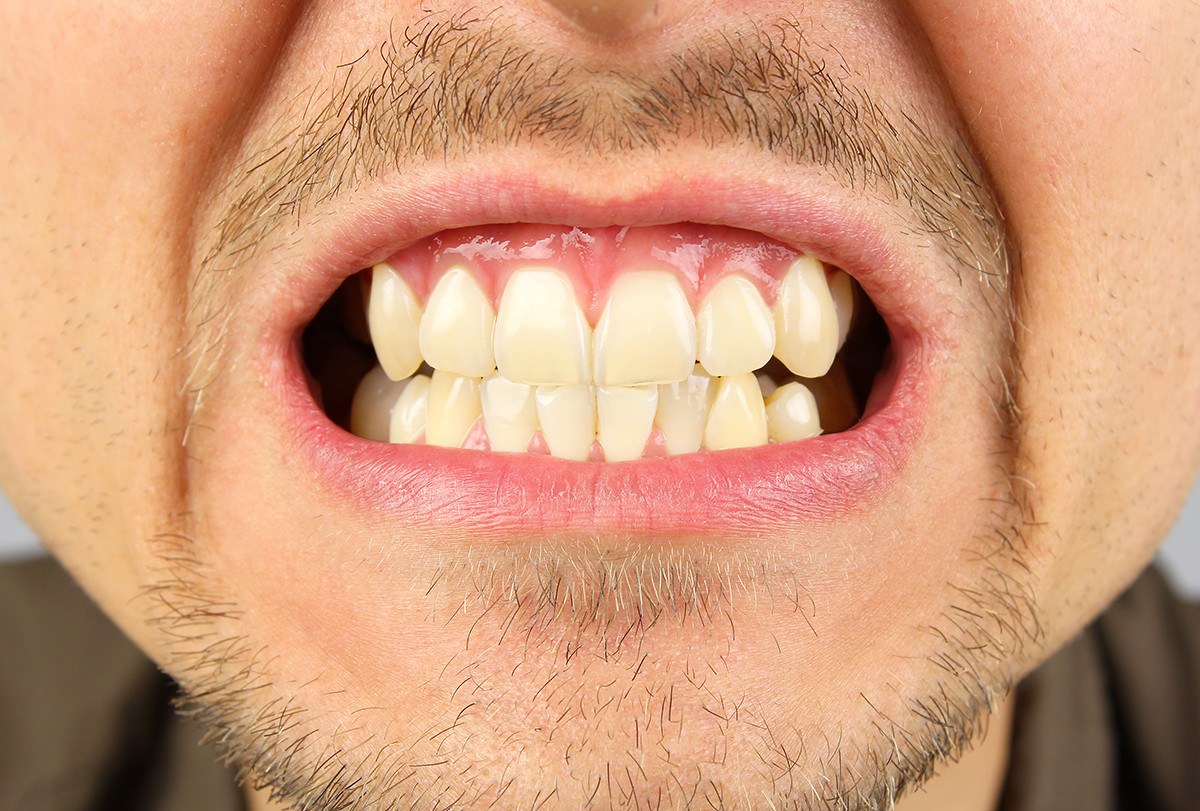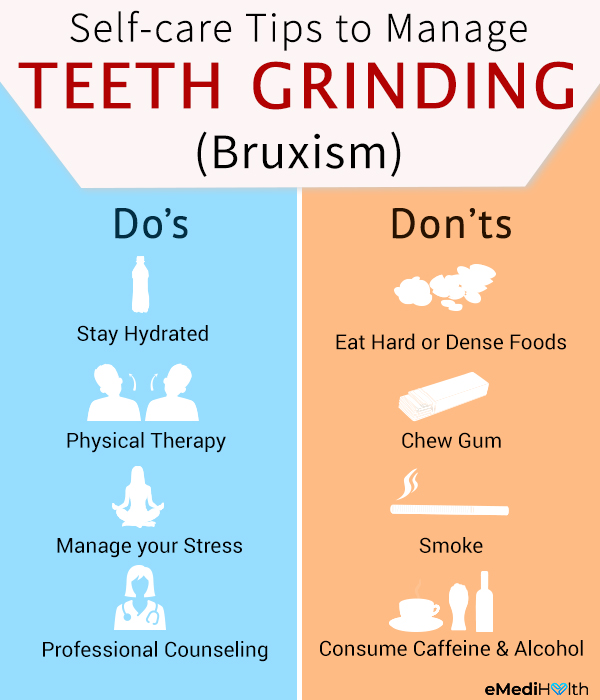In this article:
Bruxism refers to an unconscious grinding or clenching of teeth during the day time or even at night.

While little can be done to prevent bruxism in children who are sprouting new teeth, there are several tips and therapies that can help stop stress-related teeth grinding, both in children and adults.
Home Treatment
Here are a few remedies and therapies that can help manage bruxism at home without the use of any medication.
1. Try splint therapy
This involves wearing a customized mouth-guard, occlusal splint, or night-guard, as the first-line treatment for primary sleep bruxism.
The splint covers both the upper and lower sets of teeth, acting as a buffer between them. Moreover, it limits and regularizes the activity of the large jaw muscles and, thereby, reduces teeth grinding. (1)(2)
People with obstructive sleep apnea (OSA) might experience increased respiratory distress while sleeping if they wear occlusal splints and, therefore, are advised to take extra precaution. (3)
Note: Although there are over the counter mouth-guards available in the market, most dentists do not recommend wearing them as they are not customized to the patient’s teeth and can, therefore, cause further dental damage.
The use of an occlusal splint is well tolerated by most patients with bruxism as it helps to reduce the dental grinding noise and tooth damage without causing any undue side effects. (4)
2. Massage the neck, shoulders, and face
Massage therapy can work well as an adjunctive tool to release the tension in your masticatory muscles. Besides this topical stimulation also helps in activating the parasympathetic system to block pain signals from reaching the brain.
As a result, you are likely to experience less pain, even though the damage is still there. However, massage only works for bruxism if it is done right and in conjunction with other doctor-prescribed treatments such as wearing a mouth-guard. (2)
Directions:
Use gentle pressure and circular hand motions to massage the muscles of the neck, shoulders, and face for a few minutes daily, preferably before bedtime. This kind of pre-sleep ritual can help reduce the frequency and intensity of teeth grinding during the night. (2)
Massage therapy is an easy way to unclench your jaw muscles and block inhibit the perception of pain caused by bruxism by manipulating neural pathways.
3. Do these muscle stretching exercises
Physical therapy for bruxism involves certain muscle stretching exercises that are specifically designed to alleviate the discomfort associated with excessive teeth grinding or jaw clenching and prevent frequent recurrence of bruxism. (5)
When you exercise the muscle fibers, the adjoining structures such as the tendons, fascia, and nerves are stretched as well to relax your entire jaw.
Directions:
- Jaw exercise: Touch the frontal surface of your teeth with your tongue while opening your mouth as wide as comfortably possible.
- Mindful teeth placement: Maintain a gap between your upper and lower teeth at all times to avoid unnecessary clenching or grinding, except when chewing.
Note: Proper technique is important when performing these jaw stretching exercises to avoid any trauma. The risk of injury is relatively greater when you are stretching the masticatory muscles as opposed to the limb/trunk muscles, as they have smaller fibers that can rupture easily.
Jaw exercises can help make the entire targeted area more limber and comfortable, while mindful teeth placement can help prevent your upper and lower teeth from grating against one another.
4. Consume valerian tea
Valerian works as a muscle relaxant that can help de-stress your body and induce sound sleep. (6)
Directions:
- You can prepare valerian tea by steeping 1 teaspoon of its dried root in a cup of hot (not boiling) water for about 5–10 minutes, and then strain the liquid in a cup.
- You can also consume valerian as a tincture, fluid extract, or dry powdered extract, but consult your doctor for the correct dosage.
Caution: Valerian has emerged as a popular remedy for bruxism because many users found it helpful but there is still not enough scientific evidence to advocate its large-scale use. Thus, even though this ingredient is unlikely to cause any serious health risks or side effects, you must consult your doctor before taking it medicinally.
5. Use lavender to promote good sleep

Lavender can be used as a mild sedative to promote deep uninterrupted sleep. (7)
Directions:
- Aromatherapy: Put 2 to 4 drops of lavender essential oil in 2 to 3 cups of boiling water or a diffuser, and inhale the fragrant, therapeutic vapors to calm your mind and induce better sleep. If you have asthma, talk to your doctor before using essential oil inhalations to see if they are right for you.
- Tea: Boil 150 ml of water and pour it over 1 to 2 teaspoons of lavender blossoms, and let it steep for 5 to 10 minutes, then strain it in a cup.
Caution: Some people may develop an allergic reaction to lavender. Nausea, vomiting, headache, and chills have also been reported in some people after inhaling or absorbing lavender through the skin.
Lavender applied to the skin may cause irritation in some people. Oral use of lavender may cause constipation, headache, and increased appetite. Lavender oil is toxic if taken orally.
6. Drink herbal teas for a relaxing effect
Teeth grinding during sleep is aggravated by nervous tension, anxiety, or stress.
Directions:
Therapeutic beverages such as green tea and chamomile tea can help relax your mind and body to reduce the incidence of sleep bruxism. (8)(9)
Caution: Pregnant women should be especially careful before trying a new remedy, including herbal beverages, which may or may not harm their developing fetus. Always consult your doctor before taking such decisions.
These herbs do not bring relief from bruxism directly but promote sleep and thus counter nocturnal teeth grinding. This kind of adjunctive therapy should be used along with other treatment options, and under the supervision of a health care provider qualified in the field of botanical medicine.
7. Consume enough magnesium every day
Magnesium can help relieve muscle tension, specifically around the jaw, in order to unclench your teeth.
The pent up stress in your jaw muscles makes them twitch and tighten, which ultimately results in bruxism. But proper magnesium intake can help take this pressure off.
Directions:
You should consult your doctor or nutritionist about how much magnesium you should consume in a day. Generally, the daily recommended intake is 400–420 mg for men and 310-320 mg for women.
- Eat foods that are rich in magnesium as part of an overall healthy, well-balanced diet. Some excellent dietary sources of magnesium include figs, bananas, pumpkin seeds, avocados, spinach, yogurt, and dark chocolate.
- If you fail to meet your daily dosage through food sources, you can ask your doctor about starting you on a magnesium supplement.
Self-Care Tips

Here are a few do’s and don’ts that can help reduce compulsive teeth grinding:
- Avoid the following things: Hard or dense foods such as nuts, candies, and steak, chewing gum, smoking, caffeine and alcohol, especially during the evening.
- Maintain optimal fluid intake by drinking at least 7–8 glasses of water every day.
- You may also try physical therapy stretching exercises to relax the muscles and joints on each side of your head.
- Make concerted efforts to manage your daily stress, preferably by practicing relaxation therapies such as meditation, yoga, and deep breathing exercises.
- Seek professional counseling to improve your sleep hygiene.
- Try to avoid stress triggers. Additionally, share your anxieties, stress, or frustration with your loved ones or seek counseling.
- Use moist heat therapy to soothe the orofacial pain caused by bruxism. When you apply steam or a damp, warm compress on the jaw area, the heat penetrates to the underlying muscles and helps them loosen up.
- Limit physically or mentally stimulating activities too close to bedtime. The following bedtime measures can help you relax at night:
- Switch off the television and other electronics several hours before you go to bed.
- Listen to calming music to put your mind at ease before you call it a night.
- A warm shower or bath before bedtime can help relax your body and induce peaceful sleep.
- Reading in bed is also an effective stress buster.
- Deep breathing exercises an hour before going to bed can help de-stress your mind and relax your tired muscles.
How Long Does Bruxism Last?
Bruxism in kids rarely requires treatment, as it is mostly a reaction to newly emerging teeth. The problem ceases once the baby teeth are replaced by fully formed adult teeth.
Stress is also a common trigger for bruxism, both in children and adults. This type of teeth grinding is likely to last for as long as the stress persists.
How to Stop Semi-Voluntary Bruxism During the Day?
Daytime bruxism can be a habitual response to daily stressors, and it is usually semi-voluntary in nature. The best way to manage stress-related teeth grinding or jaw clenching while awake is to practice relaxation techniques such as deep breathing, yoga, and meditation daily.
Final Word
Bruxism is common in infants as they develop new teeth, and it resolves on its own. However, in adults, teeth grinding can cause discomfort and interfere with daily activities. Therefore, it is best to consult a doctor if the symptoms persist despite proper self-care.

- Was this article helpful?
- YES, THANKS!NOT REALLY



